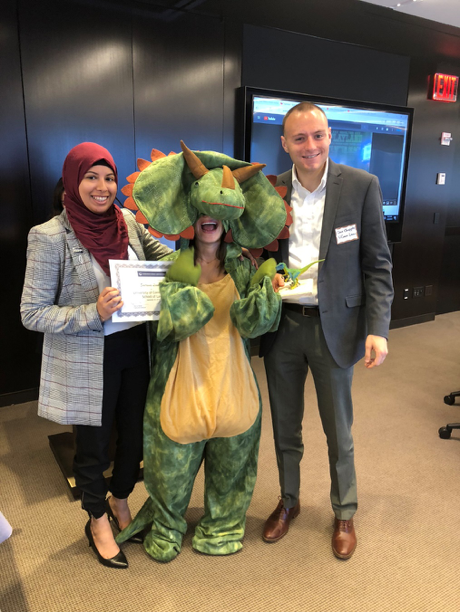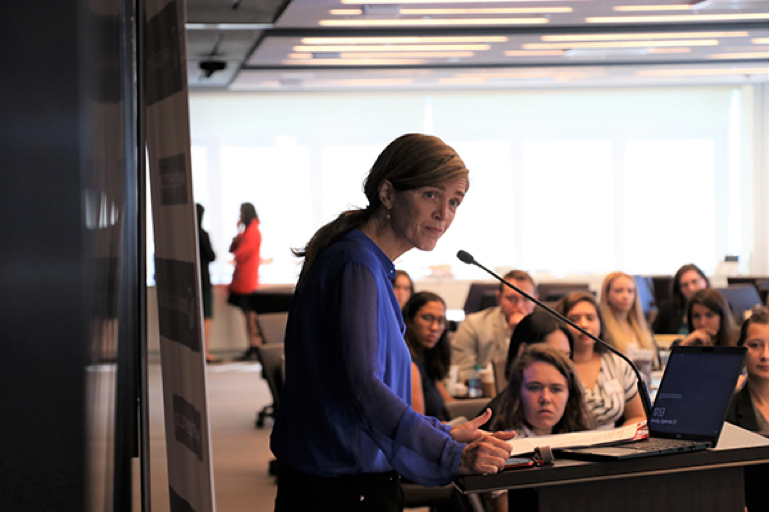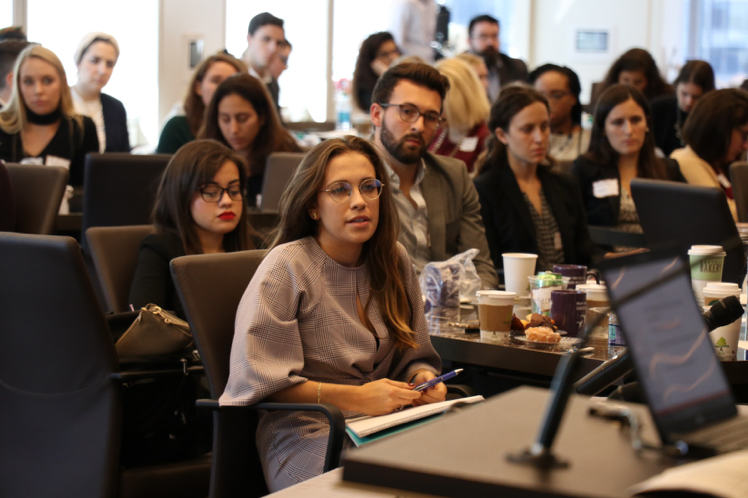
The IRAP-tor with one of the winning school chapters
“Sarah, you have to let it go.” My supervisor slowly took the file I was holding out of my hand as I gave her a sheepish smile. It was the last day of my 1L summer internship at the International Refugee Assistance Project (IRAP) and I didn’t realize how hard it would be to let it go. IRAP was originally created to assist Iraqis who had assisted the US military and because of this now needed protection, but has expanded to work with refugees all over the world. Over the few months I interned in IRAP’s NY office this summer, I didn’t realize how attached I had become to my work, my clients, the opportunity to be surrounded by like-minded people working for the same cause day in and day out. This realization came crashing down on me only on my last day, when I was handing over all of the files of clients I had spoken to and worked with. One of the greatest things about IRAP is its student chapter model. IRAP is able to assist so many clients with a relatively small staff because it organizes and connects student chapters with large law firms through pro bono projects to meet such a great need. Throughout the summer, people kept asking me why UVA didn’t have a chapter when so many other comparable institutions had run chapters for years.
I knew, that last day, that I had to start an IRAP chapter at UVA. With the help of Kimberly Emery, Assistant Dean for Pro Bono and Public Interest at UVA Law School, I was able to start an intake chapter this fall. The same day I got the chapter up and running, the NY office told me that IRAP was having its annual conference in New York City and our chapter was invited. It was in only two short weeks away, so I thought there was no way that any of us would be able to attend. However, with the help of the Law and Public Service Program, two of us were able to go. I wasn’t sure what to expect as I took the subway to the opening day of the conference, I was just excited to be part of this larger movement.

IRAP Chapters had the opportunity to learn from legal, development, ad trauma experts
The IRAP National Conference showed me the importance of coming together as a collective group. As someone who has been involved with several non-profits that utilize legal volunteers from all over the country, I had never had the chance to sit in a room with hundreds of public interest focused law students who were all working towards the same goal. The minute I walked into the room filled with people from California to Canada, I felt this palpable drive. That may sound cheesy, but it’s true. The founder of IRAP, Becca Heller, welcomed all of us with her trademark call to arms, explaining why each person in the room was key to challenging the current administration’s anti-immigrant and anti-refugee policy. She then introduced Samantha Power, the United States Ambassador to the United Nations from 2013 to 2017. Ms. Power talked about “surprising validators,” and the importance of reaching across the aisle while continuously seeking overlooked spaces for cooperation. She spoke of her time working with Obama, comparing the UN during her time as Ambassador to now, and what the future might look like for US refugee policy. She was able to imbue in us hopefulness while also being a realist, and reminded us of one of Obama’s favorite sayings: “better is good.” Seeking something better, even if not ideal, is always better than letting it go.

Samantha Powers, US Ambassador to the UN under Obama, spoke of unconventional validators
After the opening speeches, leaders from IRAP chapters around the country were able to select from several break-out groups to discuss specifics and plan for the year. The UVA IRAP chapter was able to learn more about trauma-informed lawyering, how to sue the government, and what IRAP chapters can do to lobby Congress to ensure that the Special Immigrant Visa (SIV) bill stays intact. The SIV Bill was a visa program started in 2009 for Afghan citizens who worked for the US government in Afghanistan, and the number of those admitted through SIV has decreased since the Trump Administration. The Policy Arm of UVA’s IRAP Chapter plans to work alongside other IRAP student chapters by attending the annual lobbying day this February.
One of the most useful parts of the weekend was the break times where I was able to speak with IRAP Chapter leaders from schools such as NYU, Emory, and Harvard. As the founder of a new chapter, it was so helpful to hear about the obstacles leaders faced when starting their own chapters and the successes they had after building a foundation. I listened as leaders described events their chapters had put on that engaged the larger community, such as dinners with local refugees and interactive “walk through” events in which participants physically traced all of the steps that an asylum seeker has to go through before they finally resettled in a third country. I brought these ideas back to share with the policy arm of our Chapter, and we have already schedule meetings with IRC in Charlottesville to see if we can implement these in our community.
For future lawyers who plan to use their skills to create social change, events like this cannot be underestimated. We need to interact with one another face to face, to bounce ideas off of one another, to create long-term nationwide plans. It makes us stronger. I am so grateful that the LPS Program allowed me to attend the National conference. It has made me more inspired than ever to make the UVA IRAP Chapter an effective part of this larger network. Issues of immigration have taken center stage in the last year or so, and as the number of refugees the US lets in becomes smaller and smaller, it becomes even more important to ensure that those fleeing persecution have pathways to safety, whether it is to the US or another country. IRAP is up to the challenge, and I am so excited that UVA is now a part of this collective effort.

Students were able to bounce ideas off of IRAP National staff and litigation experts
Sarah came to UVA after working with refugees and migrants in Turkey and Europe for the past few years, focusing on displaced women and the specific legal issues they face. At UVA, she is a Peer Advisor, a PILA and ACS Board Member, part of the Migrant Farmworkers Project, and founder of the Women’s Committee on SBA. She is a strong proponent of pro bono opportunities at UVA, and worked at both Bronx Defenders and Tahirih Justice Center during breaks during 1L. Sarah is specifically interested in how the law and emerging technology can intersect to solve issues of displacement. Interests: Immigration and civil rights law, gender equality work.

